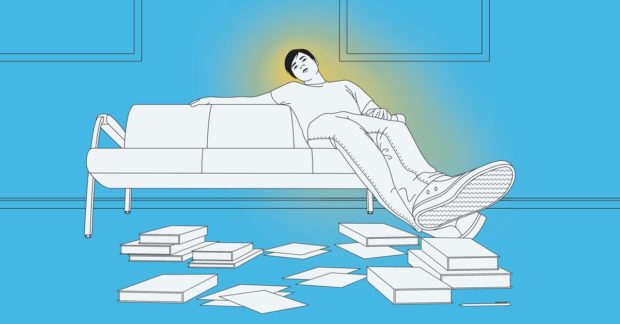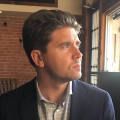You have no items in your cart. Want to get some nice things?
Go shopping
Stop me if you’ve heard this one.
A lawyer and a banker walk into a party. They start talking about the death penalty versus life imprisonment. The banker says that the death penalty is better because death comes quickly.
The lawyer completely disagrees. “To live … is better than not at all.”
The banker, a wealthy man, strikes a table with his hand and yells, “I’ll bet you two million you wouldn’t stay in solitary confinement for five years.”
“I’ll take the bet,” says the lawyer, “but I would stay not five but fifteen years.”
And he does, sort of.
Before he was coughing up blood in Germany in 1904, lamenting to his sister that he was eating too much butter and suffering from tuberculosis, Anton Chekhov had written more than two hundred short stories and more than a dozen plays. Many of these stories are regularly anthologized. “The Bet,” published in 1889, is not. Yet this tiny story, tucked away, as it were, in the library stacks of Chekhov’s better-known work, is a tale we now find ourselves living. The story of the young lawyer is the story of us, complete with the pressures, hopes, dreams, and anxieties of finding something to do with our time.
It started with music. Just two weeks ago, we all were serenaded by Italians from their windows providing neighbors with much-needed entertainment.
“For the first year of the lawyer’s confinement … the prisoner suffered severely from loneliness and depression. The sounds of the piano could be heard continually day and night from his lodge.”
“In the second year the piano was silent in the lodge, and the prisoner asked only for the classics.”
As the years pressed on, we learn that the young lawyer could be heard “angrily talking to himself.” He stopped reading and started writing. He would write late into the evening and in the morning tear everything up. Sometimes he could be heard weeping.
Then in year six – one year past the initial bet he had arrogantly tripled – he devoted himself to language, philosophy, and history. He declared, “The geniuses of all ages and of all lands speak different languages, but the same flame burns in them all.”
In the eleventh year of his voluntary self-isolation, he read the Gospel and other books on theology and histories of religion. He then asked for books from Byron and about chemistry and medicine. Chekhov says, “His reading suggested a man swimming in the sea among the wreckage of his ship, and trying to save his life by greedily clutching first at one spar and then at another.”
As the fifteenth year drew close, we learn the banker had lost most of his money in the stock market – 401Ks are, after all, the most mercurial of investments – and therefore could not pay the two million he owed the lawyer should the lawyer hold up his end of the bet. So the banker does what any other man would do faced with such a dire situation: he prepares to murder the lawyer.
*
The notion of time has captured our attention in almost every facet of our lives. We have fancy machines to count it, beautiful movies to rejoice in it (About Time, Back to the Future), Latin phrases, Shakespeare quotes. It’s everywhere. What we do with that time, however, has never been more fraught with anxiety than in the first half of 2020.
The list of suggestions for things to do while staying at home reminds me of the Litany of Saints at Easter time. Write a book. Read a book. Learn a language. Start gardening. Fix things around the house. Write a grant. Take an online class. Call your mother. Pray for us…
“Do absolutely nothing” or “be bored” haven’t made the holy list of suitable responses to the stay-at-home orders. Because time is so precious, what we do with it must be equally precious. Yet, there are benefits to boredom and there are likely anxieties to finding just the right thing to do with our time. Boredom, which is the uncomfortable lack of stimulation, has the benefit of facilitating creativity and provides a therapeutic escape from the everyday. “To ward off boredom at any cost is vulgar,” wrote Friedrich Nietzsche in The Gay Science, “no less than work without pleasure.”
In 1906, Vilfredo Pareto was one of the first economists to describe homo economicus, that idealized human who always acts rationally. Every good is maximized; every bad is minimized. Ford and MacDonald’s are two companies that have used this theoretical framework to build cars and burgers more efficiently. It has also been extended, unfortunately, to the work habits of individual homo sapiens. If we see this maximization and minimization as work, then it’s easy to understand Estern Pereen’s conclusion in You Must (Not) Be Bored! that “[n]ot working is senseless within a capitalist system characterized by a relentless push to act in an economically productive manner.”[1]
Our connection to work is problematic. I find it hard not to work at something. My wife and I moved into our home less than a year ago, and I am always seeing things that need to be fixed up or repaired or cleaned. It’s hard to sit and relax on our sofa when, in the back of my mind, there are a handful of things I could be doing.
Former Rhode Island state representative David Segal recently suggested that if the reduction in work hours caused by the stay-at-home order continued for another six or seven weeks, the average American would still finish the year having worked about as many hours as Germans work in a typical year. Business Insider’s research into the math suggests it’s mostly true. It doesn’t end with just the amount of work. In many German companies, access to a worker via phone or email is forbidden during the worker’s time off. For many of us today, even time off is rarely a guaranteed refuge from some kind of work. If we’re not working for a company, we’ll have to create some other work to do – and fast!
The fear of boredom that might come with not working is holding us back from being creative. Boredom and creativity is a relatively new area of study. In Manoush Zomorodi’s 2017 TED Talk, she related how the boredom she experienced pushing her baby’s stroller led her to some of her most creative ideas. Her “Bored and Brilliant” challenge asked people to disconnect from the digital stuff that was encroaching on their lives. Facebook – gone. Netflix – gone. Twitter – gone. Suddenly, participants were left to themselves. 90% cut down on screen time. 70% got more time to think. She said, “People told me that they slept better. They felt happier. My favorite note was from a guy who said he felt like he was waking up from a mental hibernation.”
Scholar Patricia Meyer Spacks argues that boredom today is one with “no redeeming social value: the kind that depends on excess rather than a deficiency of stimulation. The tedium of required activity, of compulsory contact, or repetitive demand: these generate the tension we readily associate with boredom, leaving no room for creativity.”[2] In other words, we could say going to the same office at the same time, working next to the same people, and doing the same tasks might be worse for us than the boredom of not being able to figure out anything else to do.
“Unplugging” physically or metaphorically has a long history from religious monks thousands of years ago to Henry David Thoreau in the 19th century. This disconnection from society in some way is the first step, but if we replace it with mindless work or puttering around the house, we’re not achieving the nirvana of boredom; we’re avoiding it.
*
Apparently, Chekhov wasn’t satisfied with his ending to “The Bet.” While readers may be surprised by it, Chekhov found it cruel. He was twenty-nine, and a medical doctor with tuberculosis, something that would drag the life out of him for the next fifteen years.
When Chekhov and his wife arrived at their hotel in
Badenweiler, Germany, in June 1904, he wrote to his sister, “The garden and the
flowers are splendidly cared for. But today, apropos of nothing, it has begun
raining; I sit in our room, and already begin to feel that in another two or
three days I shall be thinking of how to escape.” It seems that while Chekhov’s
young lawyer could live years in a small lodge, Chekhov himself got antsy
within a few days – just like the rest of us.
[1] Peeren, Esther. “You Must (Not) Be Bored!: Boredom and Creativity in Global Capitalism.” Boredom, Shanzhai, and Digitisation in the Time of Creative China, edited by Jeroen De Kloet et al., Amsterdam University Press, Amsterdam, 2019, pp. 101–109.
[2] Spacks, Patricia Meyer. “The Necessity of Boredom.” The Virginia Quarterly Review, vol. 65, no. 4, 1989, pp. 581–599.

About Michael Ward
Michael’s most recent work has appeared or is forthcoming in The New Southern Fugitives, Critical Read, and Starting Points Journal. He lives in Dallas, Texas, with his wife.




